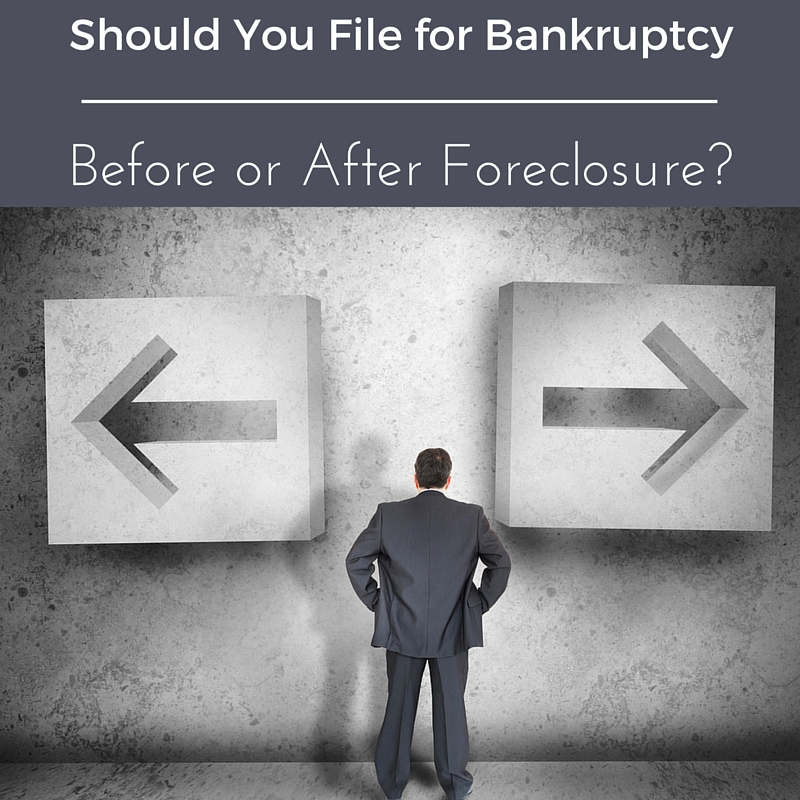Should You File for Bankruptcy Before or After Foreclosure?

If your mortgage is already significantly behind, you are facing foreclosure and you know you will be filing bankruptcy, you may question whether you should file before your home goes into foreclosure or after.
In most cases, you will benefit more if you file for bankruptcy prior to your home going into foreclosure, especially if you are filing for Chapter 7 bankruptcy.
Owing Money After Foreclosure
In many cases, when a home is foreclosed, the price the house sells for during the foreclosure sale is much less than the amount of the mortgage, especially in areas where home prices are still depressed.
The legal term for the difference between the sale price and the amount owed is known as the deficiency, although some states limit the amount of the deficiency to the difference between property value and the foreclosure price, rather than base it on the amount owed.
In Pennsylvania, the lender may obtain a deficiency judgment against you as long as it is filed within six months of the sale. If the lender purchases the property, which often happens at foreclosure sales, they are limited to filing a deficiency judgement for the difference between the fair market value and the amount of the sale.
For example, if the mortgage is $200,000, and the lender purchases the home for $150,000, but the fair market value is only $160,000, they are only able to file a judgement for $10,000. If an outside party purchases the home, the lender can file a deficiency judgement of $50,000.
Taxes Owed After Forgiveness
Many times, lenders understand that if you are losing your home to foreclosure may have little or no assets available, they will cancel the deficiency debt. However, you may now owe taxes on the amount that was forgiven unless you qualify for one of two exceptions.
The Mortgage Debt Relief Act of 2007 excludes forgiven debt to be included as taxable income if it was used to buy, build or improve your principal residence or to refinance a mortgage that was used for one of those purposes.
Debt taken out using your principal mortgage as security is also included. The maximum amount forgiven must be less than $2 million for married couples or $1 million for unmarried couples or those that file separately and only applies to mortgages obtained between January 2007 and December 2013.
There is currently legislation pending that will extend the law through 2015. If this does not apply, you may qualify for the insolvency exception where you must prove to the IRS that you were insolvent at the time the debt was cancelled. This means that your debts must have exceeded your assets at the time the debt was forgiven.
Bankruptcy Discharge and Automatic Stay
All of this means that if you file for bankruptcy after your foreclosure, any deficiency will be eliminated.
If you file after the lender has forgiven your deficiency, you may still be liable for the taxes owed on the amount that was forgiven. Therefore, it is much more beneficial to file before your foreclosure. In addition, as soon as you file for bankruptcy, an automatic stay prohibits creditors from pursuing collection activities, including action pending foreclosure.
While the bankruptcy process continues, which can take several months, you could build up savings by not paying your mortgage or other debts. This may allow you to build enough savings to save your home from foreclosure once the bankruptcy process is complete.
A lender has the right to request the stay be lifted in order to continue with foreclosure, but most lenders will wait until the bankruptcy proceedings have been completed.
If you or a loved one is facing mounting debt and foreclosure of your home, contact our office today to learn what rights you may have. You can reach us by phone or online to set up an initial consultation that could start you on the path to financial freedom and a fresh start today.



